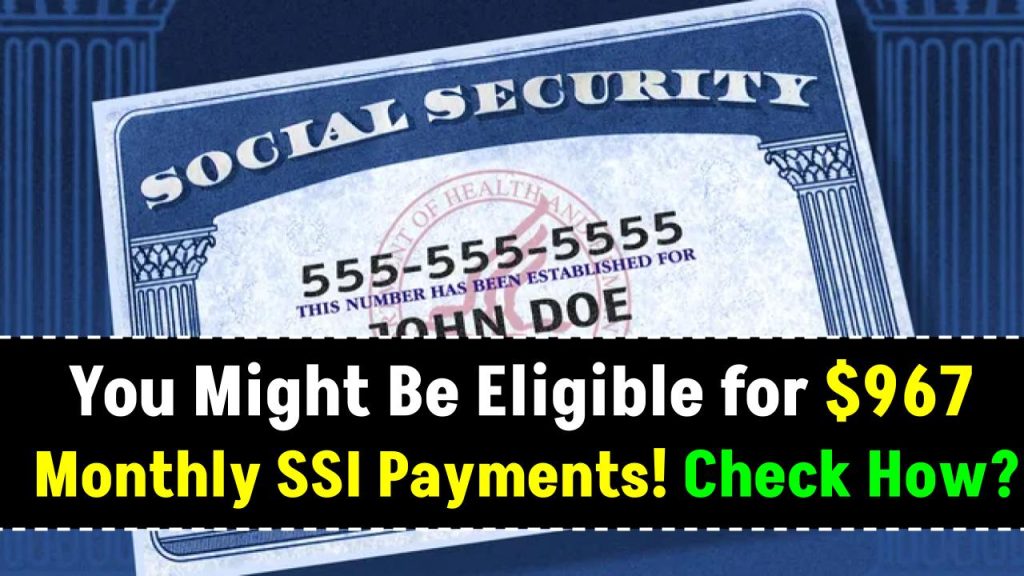
If you’re 65 or older and not eligible for Social Security benefits, you may still qualify for Supplemental Security Income (SSI), a federal program designed to provide financial assistance to low-income seniors and individuals with disabilities. In 2025, the maximum federal SSI benefit is $967 per month for an individual and $1,450 per month for couples who qualify.
Unlike Social Security benefits, which are based on prior work history and payroll tax contributions, SSI is need-based and does not require a work history. If you meet income and resource limits, you could receive monthly payments to help cover basic needs such as food, shelter, and clothing.
If You’re 65 and Not Eligible for Social Security
| Key Point | Details |
|---|---|
| Maximum SSI Payment (2025) | $967/month for individuals, $1,450/month for couples |
| Who Can Apply? | Individuals 65+ with limited income and resources |
| Income Limit | Generally, below $987/month (varies by state) |
| Resource Limit | $2,000 for individuals, $3,000 for couples |
| Application Methods | Online, phone, in-person at SSA offices |
| Official Website | ssa.gov/ssi |
If you’re 65 or older and ineligible for Social Security, you may qualify for SSI payments of up to $967 per month in 2025. This federal assistance program supports low-income seniors and individuals with disabilities. Learn about eligibility requirements, income limits, resource limits, and how to apply online, by phone, or in person. Get the full guide on how to receive your SSI benefits today!
Also check: Ex-Secret Service Agent Dan Bongino Named FBI Deputy Director—Is This a Game-Changer for America?
If You’re 65 and Not Eligible for Social Security: What Is Supplemental Security Income (SSI)?
The Supplemental Security Income (SSI) program, managed by the Social Security Administration (SSA), provides monthly payments to low-income seniors, blind individuals, and those with disabilities who meet certain financial requirements. Unlike Social Security retirement benefits, which are based on work history, SSI is entirely based on financial need.
How Is SSI Different from Social Security?
- Social Security benefits (such as retirement or disability payments) require a minimum work history where you’ve paid Social Security taxes.
- SSI is a need-based program that provides cash assistance to those with limited income and assets, even if they never worked or paid Social Security taxes.
If You’re 65 and Not Eligible for Social Security: Who Qualifies for SSI in 2025?
To be eligible for SSI payments up to $967 per month, you must meet four key criteria:
Age or Disability
- You must be 65 or older OR
- Have a qualifying disability or be legally blind.
Income Limit
- Your total income must be below a certain threshold, which varies by state.
- In 2025, the general limit for income is $987/month (before certain deductions).
- Income includes wages, pensions, Social Security benefits, and other financial sources.
Resource Limit
- Your countable resources must not exceed $2,000 if you are single or $3,000 if you are married.
- Countable resources include cash, bank accounts, stocks, bonds, and extra properties.
- Your primary home, car, and certain personal belongings are NOT counted.
Citizenship & Residency
- You must be a U.S. citizen, national, or a qualifying noncitizen.
- You must reside in one of the 50 states, Washington D.C., or the Northern Mariana Islands.
Note: If you live in a nursing home or hospital where Medicaid covers your care, your SSI benefits may be reduced.
Also Check: $1.2M Bicentennial Quarter and 3 Coins Worth Over $200K – How to Spot These Rare Coins?
If You’re 65 and Not Eligible for Social Security: How Much Can You Receive in SSI Benefits?
The maximum SSI benefit amount in 2025 is:
- $967 per month for an individual
- $1,450 per month for a couple
However, your actual payment may be lower depending on your income, living situation, and state supplements.
Some states add additional SSI benefits on top of the federal amount, which means you could receive more than $967. These states include California, New York, and Massachusetts.
If You’re 65 and Not Eligible for Social Security: How to Apply for SSI Benefits
If you believe you qualify for SSI, you can apply using three different methods:
Apply Online
- Visit the Social Security Administration (SSA) website: www.ssa.gov/ssi.
- You can start an application online and submit required documents electronically.
Apply by Phone
- Call the SSA toll-free at 1-800-772-1213.
- If you are deaf or hard of hearing, you can use the TTY number 1-800-325-0778.
Apply in Person
- Visit your local Social Security office.
- Use the SSA Office Locator to find the nearest Social Security office.
Tip: Before applying, make sure to gather necessary documents, such as:
- Birth certificate or proof of age
- Proof of U.S. citizenship or eligible noncitizen status
- Income and resource statements (bank statements, property records)
- Medical records (if applying based on disability)
Also Check: $3,089 Social Security Payment Coming Soon for Senior Couples – Check Eligibility Criteria!
If You’re 65 and Not Eligible for Social Security: How Long Does It Take to Get Approved?
- After applying, it can take 3 to 5 months for the SSA to process your application.
- If approved, your first SSI payment may include back pay for any months you were eligible.
- If denied, you have the right to appeal the decision.
If You’re 65 and Not Eligible for Social Security (FAQs)
Can I get SSI if I already receive Social Security benefits?
Yes, but your SSI payment may be reduced based on your Social Security income. You can receive both Social Security and SSI if you meet the income and resource limits.
Does SSI count as taxable income?
No, SSI payments are not taxed at the federal or state level.
Can non-U.S. citizens qualify for SSI?
Some noncitizens may qualify if they meet specific criteria, such as having legal permanent residency and meeting certain conditions.
Will my SSI amount change if I move to another state?
Yes, some states offer additional payments on top of federal SSI, so moving could impact your total benefit amount.
Can I work while receiving SSI?
Yes, but your earnings may affect your benefit amount. The SSA excludes the first $85 of earned income, but after that, SSI benefits decrease by $0.50 for every $1 earned.









